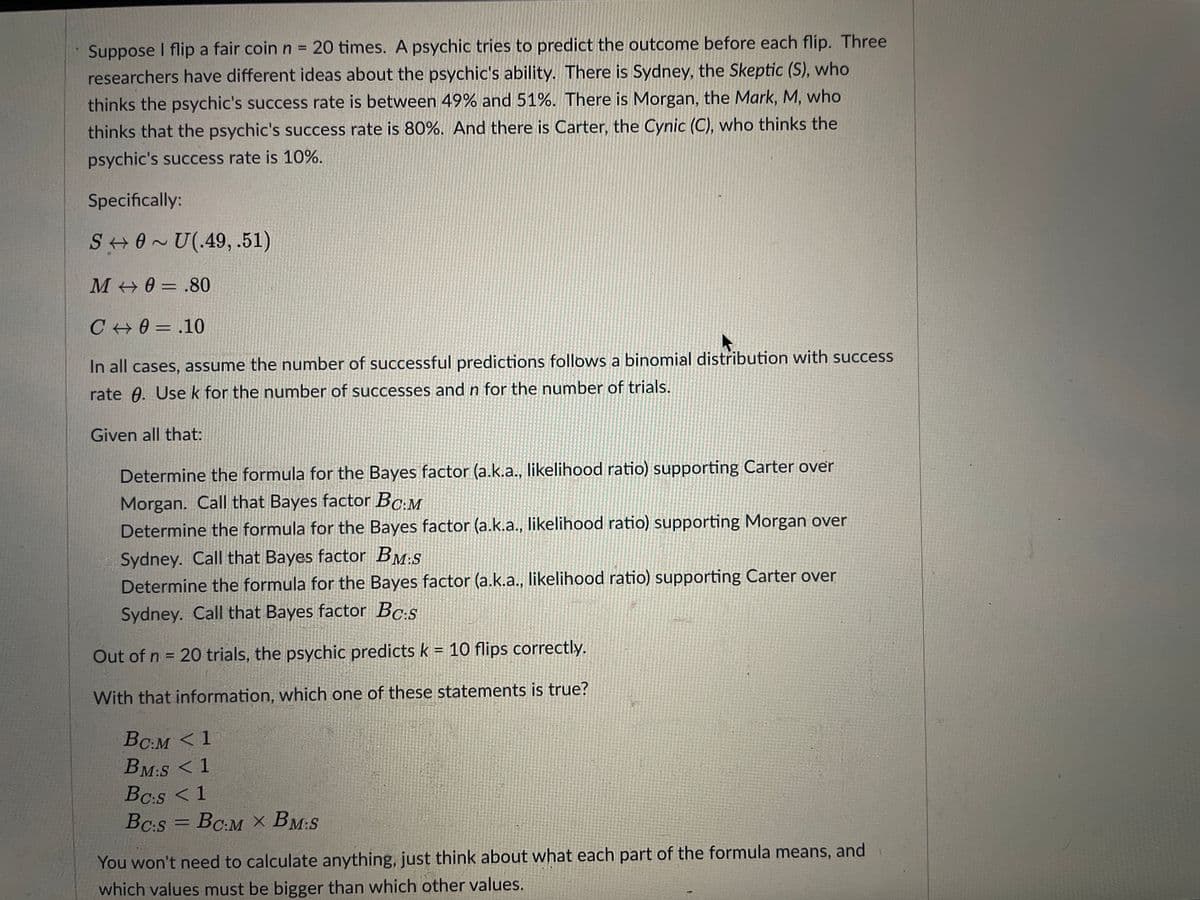Suppose I flip a fair coin n = 20 times. A psychic tries to predict the outcome before each flip. Three researchers have different ideas about the psychic's ability. There is Sydney, the Skeptic (S), who thinks the psychic's success rate is between 49% and 51%. There is Morgan, the Mark, M, who thinks that the psychic's success rate is 80%. And there is Carter, the Cynic (C), who thinks the psychic's success rate is 10%. Specifically: S0~U(.49,.51) M+ 0 = .80 C+0 = .10 In all cases, assume the number of successful predictions follows a binomial distribution with success rate 0. Usek for the number of successes and n for the number of trials. Given all that: Determine the formula for the Bayes factor (a.k.a., likelihood ratio) supporting Carter over Morgan. Call that Bayes factor Bc.M Determine the formula for the Bayes factor (a.k.a., likelihood ratio) supporting Morgan over Sydney. Call that Bayes factor BM:S Determine the formula for the Bayes factor (a.k.a., likelihood ratio) supporting Carter over Sydney. Call that Bayes factor Bc:s Out of n = 20 trials, the psychic predicts k = 10 flips correctly. With that information, which one of these statements is true? Вс.м < 1 Вм:s <1 Bc:s < 1 Bc.s Всм х Вм:S You won't need to calculate anything, just think about what each part of the formula means, and which values must be bigger than which other values.
Suppose I flip a fair coin n = 20 times. A psychic tries to predict the outcome before each flip. Three researchers have different ideas about the psychic's ability. There is Sydney, the Skeptic (S), who thinks the psychic's success rate is between 49% and 51%. There is Morgan, the Mark, M, who thinks that the psychic's success rate is 80%. And there is Carter, the Cynic (C), who thinks the psychic's success rate is 10%. Specifically: S0~U(.49,.51) M+ 0 = .80 C+0 = .10 In all cases, assume the number of successful predictions follows a binomial distribution with success rate 0. Usek for the number of successes and n for the number of trials. Given all that: Determine the formula for the Bayes factor (a.k.a., likelihood ratio) supporting Carter over Morgan. Call that Bayes factor Bc.M Determine the formula for the Bayes factor (a.k.a., likelihood ratio) supporting Morgan over Sydney. Call that Bayes factor BM:S Determine the formula for the Bayes factor (a.k.a., likelihood ratio) supporting Carter over Sydney. Call that Bayes factor Bc:s Out of n = 20 trials, the psychic predicts k = 10 flips correctly. With that information, which one of these statements is true? Вс.м < 1 Вм:s <1 Bc:s < 1 Bc.s Всм х Вм:S You won't need to calculate anything, just think about what each part of the formula means, and which values must be bigger than which other values.
Big Ideas Math A Bridge To Success Algebra 1: Student Edition 2015
1st Edition
ISBN:9781680331141
Author:HOUGHTON MIFFLIN HARCOURT
Publisher:HOUGHTON MIFFLIN HARCOURT
Chapter11: Data Analysis And Displays
Section: Chapter Questions
Problem 1CA
Related questions
Question

Transcribed Image Text:Suppose I flip a fair coin n =
20 times. A psychic tries to predict the outcome before each flip. Three
researchers have different ideas about the psychic's ability. There is Sydney, the Skeptic (S), who
thinks the psychic's success rate is between 49% and 51%. There is Morgan, the Mark, M, who
thinks that the psychic's success rate is 80%. And there is Carter, the Cynic (C), who thinks the
psychic's success rate is 10%.
Specifically:
S+ 0 ~ U(.49, .51)
M + 0 = .80
C0 = .10
%3D
In all cases, assume the number of successful predictions follows a binomial distribution with success
rate 0. Usek for the number of successes and n for the number of trials.
Given all that:
Determine the formula for the Bayes factor (a.k.a., likelihood ratio) supporting Carter over
Morgan. Call that Bayes factor Bc:M
Determine the formula for the Bayes factor (a.k.a., likelihood ratio) supporting Morgan over
Sydney. Call that Bayes factor BM:S
Determine the formula for the Bayes factor (a.k.a., likelihood ratio) supporting Carter over
Sydney. Call that Bayes factor Bc:s
Out of n = 20 trials, the psychic predicts k = 10 flips correctly.
%3D
With that information, which one of these statements is true?
Всм < 1
BM:S <1
BC:s < 1
BC:S
Вс.м X Вм:S
You won't need to calculate anything, just think about what each part of the formula means, and
which values must be bigger than which other values.
Expert Solution
This question has been solved!
Explore an expertly crafted, step-by-step solution for a thorough understanding of key concepts.
This is a popular solution!
Trending now
This is a popular solution!
Step by step
Solved in 2 steps with 2 images

Recommended textbooks for you

Big Ideas Math A Bridge To Success Algebra 1: Stu…
Algebra
ISBN:
9781680331141
Author:
HOUGHTON MIFFLIN HARCOURT
Publisher:
Houghton Mifflin Harcourt

College Algebra
Algebra
ISBN:
9781305115545
Author:
James Stewart, Lothar Redlin, Saleem Watson
Publisher:
Cengage Learning

Holt Mcdougal Larson Pre-algebra: Student Edition…
Algebra
ISBN:
9780547587776
Author:
HOLT MCDOUGAL
Publisher:
HOLT MCDOUGAL

Big Ideas Math A Bridge To Success Algebra 1: Stu…
Algebra
ISBN:
9781680331141
Author:
HOUGHTON MIFFLIN HARCOURT
Publisher:
Houghton Mifflin Harcourt

College Algebra
Algebra
ISBN:
9781305115545
Author:
James Stewart, Lothar Redlin, Saleem Watson
Publisher:
Cengage Learning

Holt Mcdougal Larson Pre-algebra: Student Edition…
Algebra
ISBN:
9780547587776
Author:
HOLT MCDOUGAL
Publisher:
HOLT MCDOUGAL